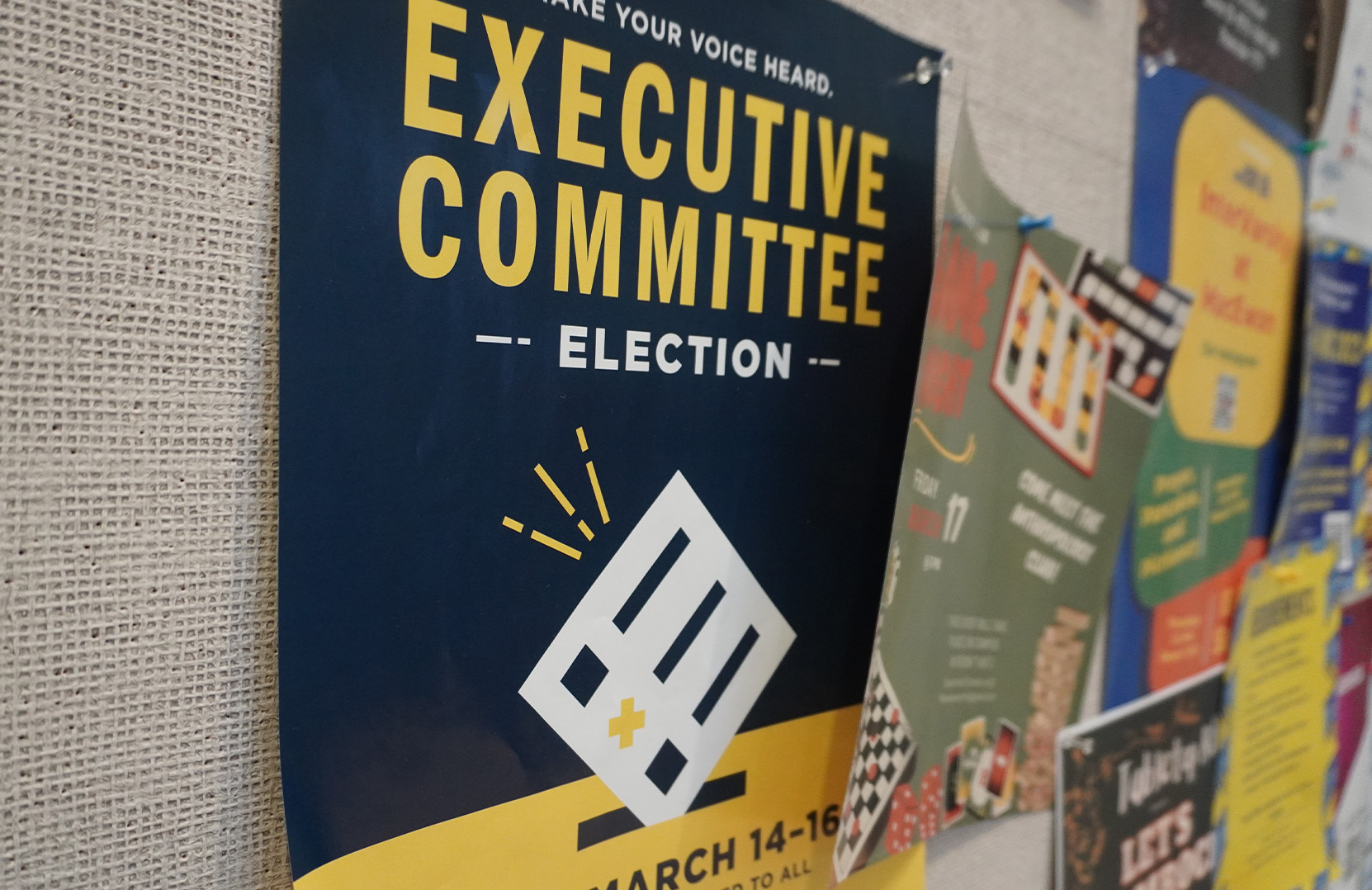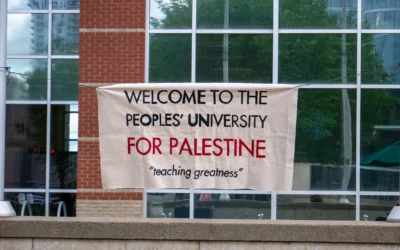Make your voice heard and vote in the election for SAMU’s executive committee election. Voting opens on March 14 and runs until March 16.
In this election, two candidates are running for vice president academic: Nathan Poon and Stephan Vasquez.
Here are the platform highlights and key goals that both candidates have, if elected. Answers have been edited for length and clarity.
Nathan Poon, vice-president academic candidate:
Why did you decide to run for the VP Academic position on the Executive Committee?
Tuition raise after tuition raise, the students I’ve spoken to feel powerless, and they feel they’ve been taken advantage of. For me personally, I feel that there needs to be a change in leadership to ensure students have access to resources that lower their cost of education. I’ve decided to run because I feel that I can apply my skills and experience to create a positive change at an executive level for our students. In addition, I ran to further engage with the wonderful community we have at MacEwan.
What are the key elements of your platform?
My platform is focused on ensuring power is brought back into the hands of our students. I want to fight rising education costs, strengthen rights and resources, and increase opportunities for students. A program I firmly believe in is the implementation of a No-Cost Textbook Program, similar to the one created at the University of Alberta during the 2021/22 Academic Year. So far, the program has saved its students over three million dollars this year alone. I will also strive to abolish the deferred exam fee, as the students I’ve spoken to feel it is an unnecessary punishment for uncontrollable circumstances that cause them to miss an examination.
How will you support students in your position?
As VP Academic, I will reaffirm MacEwan’s status as a student-oriented institution. As the student body is expected to grow to 30,000 by 2030, it is imperative that students have access to more resources, rights, and opportunities. I will work diligently with MacEwan faculty and industry leaders to ensure that our students have jobs. The last thing students should have to worry about after investing tens of thousands of dollars into their education is unwarranted costs and fees with no post-graduate employment.
As a Bachelor of Science student, I firmly believe in the vital importance of undergraduate research and internships. Many students I’ve spoken to in different programs have stressed the difficulty in finding jobs and internships related to their field. As a result, I want to use my vast connections with the community to support our students and ensure they have jobs.
What goals do you wish to accomplish on the Executive Committee?
Aside from lowering education costs and strengthening resources and opportunities, I hope to further support the student body by linking them closer to SAMU, as many students at MacEwan are unaware of the resources and supports offered by SAMU. I am hoping that my policies ultimately set a precedent for schools across Alberta, as many of the problems students face at MacEwan are also present in other post-secondary institutions.
What are some issues you feel passionately about tackling?
There were many times personally when I’ve enrolled in a class only to unexpectedly pay $100 to $200 more on materials that weren’t specified during enrollment.
One of the ways I want to put power back into the hands of our students is through ensuring that they are aware of any additional costs prior to enrolling in a course. I also feel very passionately about making sure our students have jobs. In a society where the number of degrees and diplomas are becoming saturated, we need to give our students the upper hand when they graduate, so they have the proper experience and job placements.
Why is it important that students vote in the election?
It is important for students to vote so they can have a say in who represents them. Many students are unaware that every year they pay hundreds of dollars to support SAMU. It is critical that students have their voices heard because, at the end of the day, SAMU is representing students.
Stephan Vasquez, vice-president academic candidate:
Why did you decide to run for the VP Academic position on the Executive Committee?
When I first ran for this position a year ago, I only could afford one pair of jeans. Before that, a textbook for a class was $150 more expensive than I budgeted for from student loans. That expense came out of my food budget for that term. Before that, I was ignorant of academic supports, and after a family member passed away, my grades slipped horribly. I don’t want other students to experience the issues I did. I’ve designed my platform specifically around increasing affordability to make that a reality. Due to the current affordability crisis (rising living costs, high inflation, and rising tuition) students need leaders with a plan and experience to make those goals a reality.
What are the key elements of your platform?
1) Lower educational costs by decreasing textbook costs and tuition. Specifically, the U of A has a “Zero Textbook Cost Program” that has saved their students an estimated nine million dollars from Fall 2021 to Winter 2022. I’ve been working for the past year to bring this to our campus by collaborating with the Dean of the Library, key library staff, faculty & administrators across our institution, and foundational members of the U of A program. After consulting with faculty, and the Provost, at the Committee for Teaching & Learning, we’re aiming to complete this project in Fall 2023.
For the past year I’ve designed and implemented focus groups and surveys to find out how tuition increases have been affecting students here at MacEwan. From the results of our surveys, it is abundantly clear that students cannot afford these increases. I’ve been committed to using this evidence-based advocacy during my term to continuously fight tuition increases and further negotiate increased supports for students at our institution.
2) Lower living costs by increasing the number and accessibility of scholarships, awards and bursaries, specifically, by increasing the number of targeted grants and bursaries for general students, low-income students, LGBTQIAS+ students, and Indigenous students.
Some grants or bursaries require a three-month bank statement or written essay on why the applicant should receive financial support. These unjustified barriers prevent our students from accessing vital supports. To lower living costs, I will work to remove these barriers so students can make it through our current affordability crisis.
3) Increasing post-graduate employment by increasing the number and scope of paid internships (through work-integrated learning) and micro-credentials. When we graduate, we will compete in the job market with grads from the U of A. They have an edge over us by the number and scope of micro-credentials and internships available. Approximately one third of students do not work in their chosen field for months after their graduation. To combat this, I will work with the School of Continuing Education to increase both the number and types of micro-credential and work-integrated learning opportunities for students at MacEwan. These programs can offer specific training (for example, a specialized cardiac care class for nursing students) which gives you a leg up in the job market.
How will you support students in your position?
I have a background working as a research analyst assistant at a statistical analysis company. I have used those skills I learned from that company to create evidence-based solutions for the past year. Those solutions are based on surveys and focus groups from our students at MacEwan. This ensures that my projects and goals are always in line with what the students want and need. I want to continue serving our community using these evidence-based solutions to overcome the affordability crisis we face today.
What goals do you wish to accomplish on the Executive Committee?
The rise in living and education costs has made post-secondary education extremely difficult for the majority of our community. Simply put, this cannot continue. I will work with my team to complete my platform points and assist them with their platform goals. By using evidence-based advocacy, a thorough plan of attack, and a united front of students and supportive facilities, we can overcome this affordability crisis.
What are some issues you feel passionately about tackling?
Fighting the affordability crisis with a data-driven plan, using restorative resolutions to solve academic misconduct, and removing barriers from marginalized groups (specifically, Indigenous students, LGBTQIAS+ students, female students, international students, and persons with disabilities). I’ve consulted with on-campus organizations (such as kihêw waciston and the Centre for Sexual and Gender Diversity) to find out what their needs are and how I can best support them in this role. For the past year I have worked to tackle these issues and I hope to continue for this year to come.
Why is it important that students vote in the election?
Student advocacy is a huge part of fighting for students’ needs on-campus, in Alberta, and federally. By getting involved, we unite the student voice against out-of-touch policy makers and choices that harm our ability to succeed. That’s why it is important to check on elections, their platforms, and their track-record so that we can have the best chance to fight for our needs.





0 Comments